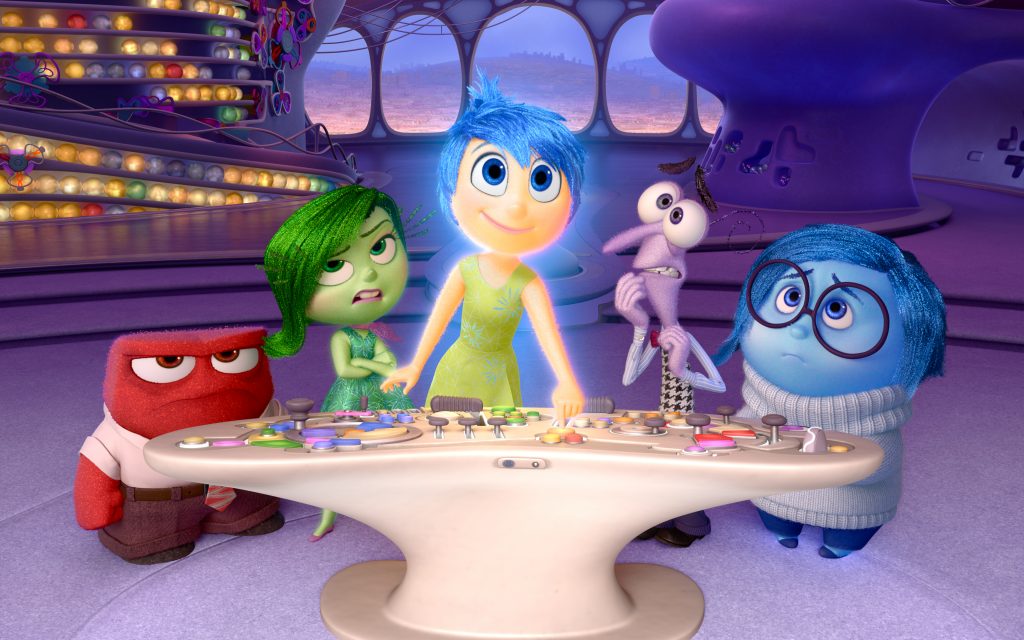5 Reasons We Bottle Up Our Emotions And What To Do

Riley reminisces a beautiful memory with her parents, when both of them were laughing heartily on their moving journey from Minnesota to San Francisco. Sadness, one of the emotions who resides in Riley’s mind, touches the memory orb, and the memory changes from yellow colour (which represents Joy) to blue (which represents Sadness). Joy is shocked and she still cannot figure out what role Sadness has to play and what purpose Sadness is in Riley’s mental health. Joy picks up a core memory involving Riley’s teammates and parents dancing after a big hockey game. Joy had always thought this core memory was a happy one, but after rewinding the memory, Joy realizes that initially Riley was sad. Her sadness caused her parents to reach out to console her and with the help of Riley’s teammates, they were able to make a sad scene a happy one.
Yes, that is one of the important scenes in the Academy Award winning film, “Inside Out”.
“Positive vibes only.”
How often do we hear of this phrase? It may be well-intentioned, however the societal demand to be happy-go-lucky all the time and not showing their real feelings can lead people to become neglectful towards real emotions and cause them to bottle them up.
Let us all visualize a situation, whereby you hold a heavy stack of books for a long distance. How would you feel? Surely you would feel exhausted and blinded with what’s directly in front of you, right?
A Harvard Medical School psychologist, Susan David, Ph.D. (2020) has once stated that bottling happens when people tend to sweep their emotions under the rug and force toxic positivity rather than accepting genuine emotions with compassion. This can eventually lead to an amplification effect.
So, what are the 5 reasons we bottle up our emotions and what are the appropriate steps that can be taken to counter this?
- We are afraid that our emotions would be invalidated by others

You : I feel like you were rude to my friend.
Your partner : Your friend is an annoying idiot who drinks too much and if you want to avoid these problems you should stop inviting him over.
You are having the above conversation with your partner. You try to have a heart-to-heart conversation with your partner, however you are met with belligerent remarks.
Perhaps you tend to bottle up your emotion because of such invalidation. Invalidation is when a partner is making you feel like he or she doesn’t understand you, or even if they understand, they simply couldn’t care less about it. You feel misunderstood and suddenly you question their feelings towards you.
According to a psychologist and marriage counselor, Dr Lisa Marie Bobby, validation is definitely crucial in relationships because validation is the cornerstone of emotional safety. Emotional safety is feeling like you are accepted and valued for who you are – like your thoughts, feelings and preferences are also important for your partner, and that your relationship is loving and supportive. This would then become the foundational base of a healthy, happy relationship.
- We view vulnerability as a weak thing

You see your male coworker suddenly retreat into his office seat, after he had been verbally abused by the manager because of a minuscule problem. His eyes are brimming with tears and suddenly he rushes to the office toilet. What do you think of him at that time? Was it against the facade of masculinity that a guy is supposed to be portraying?
Commissioned by men’s health charity Movember and conducted by research firm Ipsos MORI, the study surveyed 4,000 men across the U.S., Canada, the U.K., and Australia about their perceptions of masculinity and expressing emotions. 58% of men in that study feel like they are expected to be “emotionally strong and to show no weakness,” and 38% of men have avoided talking to others about their feelings to avoid appearing “unmanly”. Over half (53%) of American men between ages 18 and 34 say they feel pressure to be “manly,” and 22% of those in this age group say they’re always or frequently mocked for “not being manly enough.”
Similarly, this problem of being expected to “man up” might also be experienced by the women who are climbing up the ladder in the corporate sector or any leadership role.
Venting out about your feelings is of utmost important to your well-being, regardless of gender. According to a board-certified clinical psychologist Kristina Hallett, Ph.D, ABPP, vulnerability should be championed. This means we need to normalize men talking about their feelings, crying and screwing up without calling into question their ‘manliness’.
Embrace vulnerability. Be an active listener towards colleagues who are suffering, no matter what the gender is.
- We are afraid that we would lose people if we say about what we think directly

Have you ever experienced having a fear of intimacy towards your partner, in which you are afraid to voice out the things that you don’t like about your significant other? You tend to repress your innermost thoughts because you are afraid that by being that vulnerable, you would lose your loved ones.
According to a psychotherapist, Ken Page (2020), fear of intimacy is not a character flaw that makes us unfit for love. In fact, it is the very core of the human experience. We develop this kind of fear because for us, love is the most valuable thing in the world, and losing it is perhaps life’s greatest pain.
One of the most comprehensive longitudinal studies of human development, the Harvard Grant Study, offers us an extraordinary jump-start in comprehending intimacy. Director of the study, George Vaillant, M.D., found the most important personality characteristic for finding love and happiness is a mature coping style that does not flee from intimacy and push love away.
How to actually remove this fear of intimacy? You and your partner should cultivate a “safe space”, refraining from judgment or contempt when the other is sharing. In this space, you and your partner should interact in a more open and honest way, and always make sure to validate each other’s feelings. As humans, we confide in people whom we trust. That doesn’t mean they always tell us what we want to hear, but we believe that they will listen to our deepest fears and insecurities without belittling us about it. Therefore, try to engage in deeper, more introspective conversation together with your partner, talking about emotions and experiences you don’t usually share with others. Likewise, ask your partner thoughtful questions and be curious about the way they think and feel. Listen to understand rather than waiting to respond (Deadwiler & Overstreet, 2020).
- We are putting other peoples’ needs before ourselves

Imagine this! You are at home, chilling in front of the television since today you are taking a day off, all of a sudden your phone rings. It is from your supervisor, he is the one who would always call you even if you are not supposed to be working on that day. What is your response? Are you tempted to accept that call, since you are afraid you would be on the wrong side of him?
As stated by a clinical psychologist, Dr Lisa Firestone, most of us are taught from the early age that being selfless is a good thing, and there are many proven benefits of altruism, to both our mental and physical wellbeing. However, this can actually give a wrong message to ourselves, that pushing ourselves to the limit and forgo our needs is a normalcy and it can be taken to an extreme in our everyday lives. Eventually, this will lead to depletion, our emotional cup is dried up, therefore we would drain ourselves of energy and desire.
So, in the situation described above when your colleague calls you during your offday, what should you do? You need to set up your boundaries, and tell yourself, it’s alright to ignore the call since it is not your responsibility to be working on that day. We would definitely feel the major difference and shift in attitudes when we give from the “overflow” rather than from the “empty cup”. When we give from a place of having something to offer, for example – happily making a cup of coffee in the morning for your significant other, helping a colleague at work, doing a favour for a friend; rather than doing it because we think we “should”, we are more likely to show up fully for the people to whom we extend ourselves (Firestone, 2017).
- We fear of being labelled “too sensitive”

You have just returned to the hostel from your college friend’s wedding ceremony. You have spent the entire day at her house, helping out to package the door gifts, until the ceremony ended near dusk. You plonk onto your bed, apparently, feeling so drained out. However, you notice that your roommate who has gone to the same event as you, is still energetic, she even invites you to go with her to the nearby cafe which is open for 24 hours, to study with her together. That is just because of your hyper-perceptive system which is picking up on more; what other people are saying, what they are feeling as well as the collective energy of the room. Thus, you simply have more to process at the end than your less sensitive friend (Richardson, 2020).
You might tend to bottle up your emotions because of your hyper-perceptive system and you experience your emotions more intensely. You feel dreadful of being labelled as “too sensitive”. It leaves you feeling confused and ashamed, which eventually intensifies your emotions. People tend to label you such a way, thus making you feel misunderstood and alienated. Therefore, the easiest way to avoid such judgments is to keep the emotions to yourself.
You can develop a daily, weekly, and monthly grounding routines that will keep you centered in your own energy, like meditating each morning, listening to the same upbeat podcast or meeting a friend for dinner once a month – to feel more stable. Remember, recharging after a long day of socializing will help you to calm down and boost your energy for your next activity.
REFERENCES
Bobby, L. M. (2020, October 01). Feeling invalidated or ignored by your partner? (read this). Retrieved April 05, 2021, from https://www.growingself.com/feeling-invalidated/
Chapman, B. P., Fiscella, K., Kawachi, I., Duberstein, P., & Muennig, P. (2013). Emotion suppression and mortality risk over a 12-year follow-up. Journal of Psychosomatic Research, 75(4), 381-385. doi:10.1016/j.jpsychores.2013.07.014
Deadwiler, A., & Overstreet, K. (2020, September 20). Every relationship needs these 4 types of intimacy (beyond the physical). Retrieved April 06, 2021, from https://www.mindbodygreen.com/articles/types-of-intimacy-besides-sex
Firestone, L. (2017, August 17). The unselfish art of prioritizing yourself. Retrieved April 06, 2021, from https://www.psychologytoday.com/us/blog/compassion-matters/201708/the-unselfish-art-prioritizing-yourself
Gonsalves, K. (2019, October 16). Study shows men still feel judged when they talk about their feelings. Retrieved April 05, 2021, from https://www.mindbodygreen.com/articles/men-think-expressing-emotions-threatens-masculinity-study-shows
Kruse, A. (2020, June 28). Empathy in the workplace is vital – especially during covid-19. Retrieved April 05, 2021, from https://www.mindbodygreen.com/articles/empathy-in-workplace-and-why-its-so-important-during-covid-19
Moore, A. (2020, August 30). Bottling vs. Brooding emotions – why both are bad for mental health. Retrieved April 05, 2021, from https://www.mindbodygreen.com/articles/bottling-vs-brooding-emotions
Page, K. (2020, March 28). Why do you push love away? 3 steps to stop, from a psychotherapist. Retrieved April 06, 2021, from https://www.mindbodygreen.com/articles/why-you-push-love-away-and-three-steps-to-change-that-from-expert
The happiness effect (2011). Bull World Health Organ, 89(4), 246–247. doi: 10.2471/BLT.11.020411
Richardson, T. C. (2020, September 02). These 7 signs of heightened sensitivity are giveaways that you’re an empath. Retrieved April 06, 2021, from https://www.mindbodygreen.com/articles/7-ways-empaths-are-more-sensitive



Responses